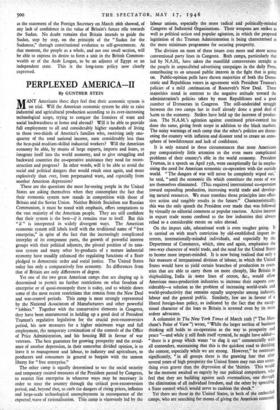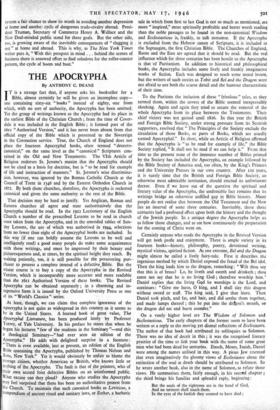PERPLEXED AMERICA-II
By GUNTHER STEIN •
MANY Americans these days feel that their economic system is on trial. Will the American economic system be able to raise industrial and agricultural production according to its ever-increasing technological scope, trying to conquer the frontiers of want and social backwardness at home and abroad? Will it be able to provide full employment to all and considerably higher standards of living to those two-thirds of America's families who, receiving only one- quarter of the total national income, earn considerably less than the best-paid medium-skilled industrial workers? Will the American economy be able, by means of large exports, imports and loans, to integrate itself into the world economy, and to give struggling and backward countries the co-operative assistance they need for recon- struction and progress? In other words, will it be able to avoid the social and political dangers that would result once again, and more explosively than ever, from perpetuated want, and especially from another American depression?
These are the questions the most far-seeing people in the United States are asking themselves when they contemplate the fact that their economic system now stands in competition with those of Britain and the Soviet Union. Neither British Socialism nor Russian Communism, it must be noted with emphasis, offers temptations to the vast majority of the American people. They are still confident that their system is the best—if it remains true to itself. But this "if " is interpreted in widely divergent ways. The American economic system still labels itself with the traditional name of " free enterprise," in spite of the fact that the increasingly complicated interplay of its component parts, the growth of powerful interest groups with their political adjuncts, the pivotal position of its taxa- tion system and many other by-products of a mature industrial economy have steadily enhanced the regulating functions of a State pledged to democratic order and social justice. The United States today has only a comparatively free economy. Its differences from that of Britain are only differences of degree.
Yet one of the two great American camps that are shaping up is determined to permit no further restrictions on what freedom of enterprise or of quasi-monopoly there is today, and to whittle down some of the most recent restrictions that remain from the New Deal and war-control periods. This camp is most strongly represented by the National Association of Manufacturers and other powerful " lobbies." Together with the conservative elements in Congress, they have been instrumental in holding up a good deal of Presideni Truman's regulative legislation for the crucial post-reconversion period, his new measures for a higher minimum wage and full employment, the temporary continuation of the controls of the Office of Price Administration, and his housing Bill in favour of war veterans. The best guarantee for growing prosperity and the avoid- ance of another depression, in their somewhat divided opinion, is to leave it to mapagement and labour, to industry and agriculture, to producers and consumers in general to bargain with the utmost liberty for " free enterprise."
The other camp is equally determined to see the social security and temporary control measures of the President passed by Congress, to restrict free enterprise in whatever ways may be necessary in order to steer the country through the critical post-reconversion period, and, beyond that to curb the dangers of rising prices, inflation and large-scale technological unemployment in consequence of the expected.wave of rationalisation. This camp is vigorously led by the labour unions, especially the more radical and politically-minded Congress of Industrial Organisations. Their weapons are strikes as well as political action and popular agitation, in which the proposed legislation of the Truman Administration is being characterised as the mere minimum programme for securing prosperity.
The division on most of these issues cuts more and more across conventional party lines in Congress. Both camps, particularly that led by N.A.M,. have taken the manifold controversies straight to the people in unparalleled advertising campaigns in the daily Press, contributing to an unusual public interest in the fight that is going on. Public-opinion polls have shown majorities of both the Demo- cratic and Republican voters in agreement with President Truman's policies of a mild .ontinuation of Roosevelt's New Deal. These majorities stand in contrast to the negative attitude toward the administration's policies taken by most Republicans and a good number of Democrats in Congress. The still-undecided struggle between the two camps has in itself already done a good deal of harm to the economy. Strikes have held up the increase of produc- tion. The N.A.M.'s agitation against continued price-control has done the same, giving fresh scope in addition to the black markets. The noisy warnings of each camp that the other's policies are threat- ening the country with inflation and disaster tend to create an atmo- sphere of bewilderment and lack of confidence.
It is only natural in these circumstances that most Americans pay comparatively little attention to the even more complicated problems of their country's role in the world economy. President Truman, in a speech on April t5th, went exceptionally far in empha- sising the need for American economic co-operation with the outside world. "The dangers of war will never be completely wiped out,- he said, " until the economic ills which constitute the roots of war are themselves eliminated. [This requires] international co-operation toward expanding production, increasing world trade and develop- ing natural resources. We must translate those principles into effec- tive action and tangible results in the future." Chafacteristically, this was the only speech the President ever made that was followed by virtually no editorial comment or popular reaction. Active interest in export trade seems confined to the few industries that always relied to a considerable extent on sales abroad.
On the import side, educational work is even tougher going. It is carried on with much conviction by old-established import in- terests, internationally-minded individuals, and especially by the Department of Commerce, which, time and again, emphasises the two-way character of world trade, and the need for the United States to bcome more import-minded. It is now being realised that only a fair measure of international division of labour, in which the United States would have to yield certain branches of production to coun- tries that are able to carry them on more cheaply, like Britain in shipbuilding, India in some lines of cotton, &c., would allow American mass-production industries to increase their exports con- siderably—a solution to the problem of increasing world-trade and world-productivity that remains equally unpopular among industry, labour and the general public. Similarly, few are in favour of a liberal foreign-loan policy, as indicated by the fact that the excep- tional character of the loan to Britain. is stressed even by its most ardent advocates.
A columnist in The New York Times of March loth (" The Mer- chant's Point of View ") wrote, " While the larger section of business thinking still holds to co-operation as the way to prosperity and peace "—and while it still finds itself stymied, he might have added- " there is a group which wants ' to slug it out ' commercially with
all contenders, maintaining that this is the quickest road to deciding
the contest, especially while we are strong. However," he continues significantly, " in all groups there is the gnawing fear that after several years of high prosperity the United States may run into some- thing even graver than the depression of the 'thirties. This would be the moment awaited so eagerly by our political competitors, who feel that they are building against such eventualities, one through the elimination of all individual freedom, and the other by spreading a State control which would serve to cushion the shock." Yet there are those in the United States, in bosh of the embattled camps. who are searching for means of giving the American economic
system a fair chance to show its worth in avoiding another depression at home and another cycle of dangerous trade-rivalry abroad. Presi- dent Truman, Secretary of Commerce Henry A. Wallace and the New Deal-minded public stand for these goals. But the other side, too, is growing aware of the inevitable consequences of " slugging it out " at home and abroad. This is why, as The New York Times writer puts it, " With this prospect in mind .. . behind the scenes of business there is renewed effort to find solutions for the roller-coaster pattern, the cycle of boom and bust."































 Previous page
Previous page